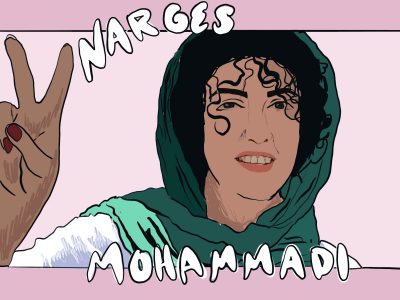Written by Kiana
This past week, the Nobel Peace Prize was awarded to Narges Mohammadi, an Iranian women’s rights advocate and human rights activist.
Mohammadi has been an outspoken critic of the Iranian government’s record on human rights — particularly those of women — and has sacrificed her freedom to fight for the freedom of others. She receives the Prize from prison, where she is incarcerated for her activism.

She has fought tirelessly against normalized injustices regarding capital punishment, freedom of speech and solitary confinement.
This award comes at a tumultuous time in her home country, where protests have continued since they erupted in December 2022. Mahsa Amini, a 22-year-old Iranian woman, was killed in police custody after she was arrested for wearing her headscarf improperly.
Ever since, thousands of protesters have flooded the streets, women burning their headscarves, risking arrest and jail time, all chanting “Zan, Zendegi, Azadi. Women, Life Freedom.”
Iran is one of the only countries in the world with a mandatory dress code for women. Women must cover their hair, and failure to obey is punishable by law.
I don’t believe wearing a hijab is an inherently oppressive practice, and to do so would woefully misunderstand the teachings of Islam. The removal of the headscarf is nonetheless a symbol of the Iranian women’s rights movement.
It is not only about the freedom to wear or not wear a headscarf, but also the freedom of divorce, child custody, travel without a man’s permission, inheritance and a vast range of other rights women are denied. Gaining the right to choose to wear a headscarf is the first step in gaining all the rights that follow.
The importance of Mohammadi winning the Nobel Peace Prize cannot be overstated. Her activism, often in the face of significant personal risk, is a testament to the life-or-death importance of human rights.
It has drawn global attention to the situation in Iran. Her selection sends a powerful message that the world stands in solidarity with Iranians facing injustice — a prodigious recognition for a country that has been largely sanctioned, censored and villainized.
Additionally, her recognition underscores the need for the international community to hold Iran’s government accountable for their actions and show solidarity to its people. The people of Iran do not, by any means, necessarily support or agree with their theocratic government.
This message extends beyond Iran — other countries facing government oppression learn from Iran’s example that their actions do not go unnoticed and the activists they’d like to silence have international support.
The Prize also serves as an inspiration for other activists globally. Their path is a difficult one — Mohammadi herself has been sentenced to a total of 31 years in prison and is still serving that time. Her Nobel Peace Prize is not only a recognition of her bravery and dedication, but also an inspiration for continued efforts to promote justice and gender equality in Iran and beyond.
Narges Mohammadi is not the first Iranian women’s rights activist, and she won’t be the last. Shirin Abadi, an Iranian lawyer and activist, won the Nobel Peace Prize in 2003 when Iranians were fighting for their rights. More than a decade later, they are still fighting and still winning. And until they have liberty, women will protest, march, organize and unite for “Zan, Zendegi, Azadi.”
This is an account occasionally used by the Daily Free Press editors for posts with multiple authors or otherwise for special circumstance publications. See authorship info on the byline at the top of the page.




